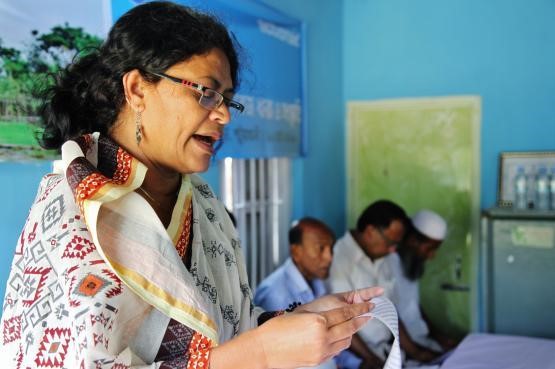

14 March 2016 was a more eventful day than other days. There was a festive atmosphere in the office. From the morning, candidates of Feminist Leadership Forum (FLF) were conducting their campaign for the new convener position. After successful campaign, election formality started at 3 pm. The former convener handed over the responsibility to the newly elected convener.
Some of us could not participate in the post-election ceremony because we had to start for Kuakata. In the evening, six member team left office for Sadarghat launch terminal. On that day, Dhaka city traffic system collapsed. However, our driver vais’ (brothers) avoided the traffic congestion very efficiently and reached the launch terminal before well ahead of reporting time. By the time a few more teammates joined us at the terminal, more than two hours remained before the launch (large public ferry) would leave port. We were roaming from deck to deck inside the launch. However, the time was dedicated for hawkers. They were too much busy selling food and that was the best time for their business. We also bought some food from them. Finally at 9 pm our launch left the terminal.
We reached Barisal on the next day early morning. The sun was shining bright. We came out from the launch and had local food for breakfast. Then we split in two teams and headed for Kuakata by car. The car I was on was slower than other team. We paused our journey two times for the meeting two local journalists. This is how the advocacy work already started before even reaching the venue.
In the humid evening, we attended the first session of the first day of Conference on ‘Right to Water and Defending Commons’. Biren Nayak, Program Manager of ActionAid International, presented the report of a study styled ‘Blues beyond Boundary’. The study was conducted in four countries and Biren presented the Indian part of the report. He explained major findings of the study, the water issue in general and the weak water governance with its impact on women and climate.
We came to know that 29.6% families are residing at their present place since their childhood, 15% people have changed their habitation more than 10 times and 47.2% people were affected due to faulty water management system. According to him, river should not be recognized as countries boundary; it is beyond that.
Once roaring Padma river is now reduced to a desert, said fisherman Tahasen Ali who has been living on a boat for decades and now finds no viable option.
Director of WaterAid Bangladesh, Dr. Liaquat Ali, stated that water has the relation with social, environmental, political and religious issues. Although water is a resource but we do not value it. That we need to change our thinking with proper water management, scientific research, identifying the problems made in the name of development.
Professor of Dhaka University Dr. Imtiaz Ahmed, ActionAid Bangladesh’s Country Director Farah Kabir, and Executive Director of partner NGO AVAS Rahima Sultana travelling separately from Dhaka also joined the event. Imtiaz Ahmed said, we are developing and progressing, building roads, bridges and these are land-centric development. But we are forgetting river and water.
What started rather as a warm-up session on the afternoon we reached appeared to be technically heavy than the audience would expect. The next day was the main platform as the large audience included development practitioners, government officials, journalists and – most importantly – the people of the communities who face the crises from the fore-front.
The key discussant Professor Imtiaz Ahmed talked emphasised River Symposium where people from all walks of life can participate. He believes that, if people do not exist then nothing is true, that we are not yet ready to understand the value of water. He feared that a time will come when water will be more valuable than gold. Hence from now on, he suggested, we should treat water as gold, for which technology is not sufficient. Change of our practices and habits is must. Imtiaz Ahmed strongly stated that our development efforts need to be water-centric as opposed to the age-old land centric approach.
Community people think despite adequate water, we cannot use it properly. That, we need to properly maintain the embankments and the sluice-gates. Community leader Savita Rani shared about her childhood experience related to water. Her mother used to say, we should make everyone aware about the proper use of water.
Due to salinity, we are losing arable land; but to counter that, we are developing salt-tolerant varieties of crops. It is a kind of cold war not a solution, said AKM Shamimul Haque Siddiqui, District Commissioner of Patuakhali.
At this stage of the programme, honourable guests present at the conference inaugurated the Water Museum website.
Water is a resource and proper development is not possible without the protection and honour it deserves. For beautiful future of the rivers and its people, the rights of water must be ensured, said Farah Kabir.
The second session of the event was held at the Water Museum itself – 19 kilometres from the conference venue. Rahima Sultana Kajal read out the Kuakata Declaration coming forward with a set of demands the community people put forward.
Before we boarded the return ferry, we paid AVAS a visit. We met the extended AVAS family as the granddaughter (a tiny tot) of the Executive Director welcomed us from her grandmother’s lap. The next morning we returned to base with lots of experience and motivation to do something good for water.